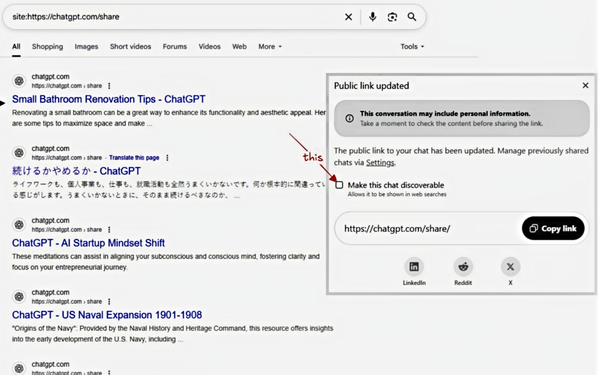
Chatbot users have discovered that every question asked
and response given are potentially visible to millions.
That’s when OpenAI removed the feature from ChatGPT that allowed users to make their conversations discoverable by search engines,
such as Google.
“This was a short-lived experiment to help people discover useful conversations,” Dane Stuckey, chief information security officer (CISO) at OpenAI, wrote in a post
on X. “This feature required users to opt-in, first by picking a chat to share, then by clicking a checkbox for it to be shared with search engines.”
OpenAI decided the feature
introduced too many opportunities to accidentally share things they did not intend to share, so the company removed the option.
“We're also working to remove indexed content from the
relevant search engines,” Stuckey wrote. “This change is rolling out to all users through tomorrow morning.”
advertisement
advertisement
Security and privacy have become challenges for companies
developing large language models (LLMs), agentic AI agents, and chatbots for online stores. Stuckey explained in his post that OpenAI plans to keep working to make products and features more
secure.
Secure, yes, but not before search engine optimization managers like Jim Hunt discovered his chat dialog and information indexed in Google.
Hunt, SEO manager at LLYC, a global
corporate affairs and marketing consulting firm, discovered when using ChatGPT and select "Make this chat discoverable," it creates more than a shareable link. The conversation gets published on the
internet making it searchable by anyone on Google, Hunt explains.
He gave examples of exposed data found by security researchers. Some include API keys and authentication tokens, personal
email addresses and phone numbers, proprietary business strategies, and confidential code and algorithms.
The most concerning part, he wrote in the LinkedIn blog post, is that "many users have
no idea their 'private' conversations with AI are now public search results."
Hunt has found conversations where people discussed medical conditions, financial situations, and relationship
problems.
All of the content become indexed and searchable, which turns into a "SEO gold rush" for advertisers and marketers because content from ChatGPT can boost domain authority, create
high-quality backlinks, and potentially rank higher for hundreds of thousands of keywords.
Hunt believes it creates a new media channel for marketers, but it does create an "ethical gray area
to navigate" -- especially if the person’s chat, without them knowing, finds its way to Google search.
Before OpenAI switched off the option, many SEO experts took to LinkedIn and X to
share how to protect user privacy.
Some users—perhaps Google link builders for SEO--were not happy that OpenAI removed the feature.
“Oh my god!” one user wrote on X.
“Don’t remove features for people who don’t read!! Jeezus put a bigger banner for the careless users. It was very useful to have discoverable links. Bring it back.”